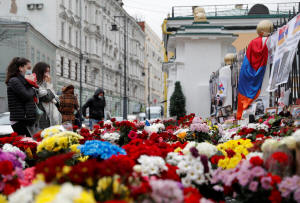Nagorno-Karabakh ceasefire strained by new fighting, bitter rhetoric
 Send a link to a friend
Send a link to a friend
 [October 20, 2020]
By Nvard Hovhannisyan and Nailia Bagirova [October 20, 2020]
By Nvard Hovhannisyan and Nailia Bagirova
YEREVAN/BAKU (Reuters) - A ceasefire in the
mountain territory of Nagorno-Karabakh was under severe strain on
Tuesday after fierce new clashes between Azeri and ethnic Armenian
forces fighting their deadliest battles since the 1990s.
The ceasefire, agreed on Saturday, has had little impact on fighting
that began on Sept. 27, despite concerns it could spark a wider conflict
involving Russia and Turkey.
In an interview, Armenian President Armen Sarkissian accused Turkey of
destabilising the South Caucasus with its strong backing for Azerbaijan.
But he said he did not advocate military intervention by Russia, which
has a defence pact with Armenia.
"What Iím preaching is not involving Russia and then tomorrow Iran and a
third party, and making Armenia and Azerbaijan and the Caucasus another
Syria," he told France-24 television.

"What Iím saying here is that instead of talking about involving Russia,
we have to talk about excluding Turkey, which has a completely
destructive role here."
Ankara denies accusations by Armenia, France and Russia that it sent
mercenaries from the conflicts in Syria and Libya to fight in
Nagorno-Karabakh, which broke away from Azerbaijan as the Soviet Union
collapsed.
In comments to Azerbaijan's parliament, Turkish Parliament Speaker
Mustafa Sentop portrayed Armenia as the aggressor and criticised
mediation led for years by France, the United States and Russia under
the auspices of the OSCE security watchdog.
"If they are sincere on their path to peace, those who have held
Armenia's leash and supported it for years need to end this dangerous
game now and stop supporting Armenia. Azerbaijan does not have another
30 years to wait," Sentop said.
The OSCE's Nagorno-Karabakh mediating panel, known as the Minsk Group,
"is brain dead", he said.
NEW FIGHTING REPORTS
Several hundred people have been killed since Sept. 27 in fighting
involving drones, warplanes, heavy artillery, tanks and missiles,
raising fears of a humanitarian crisis and concerns about the security
of oil and gas pipelines in Azerbaijan.
[to top of second column]
|

People visit a makeshift memorial outside the Armenian embassy for
the victims of a military conflict over the breakaway region of
Nagorno-Karabakh in Moscow, Russia October 20, 2020. REUTERS/Evgenia
Novozhenina

The new ceasefire appears to have had no more effect on fighting
than an earlier deal brokered by Russia that failed.
Azerbaijan wants an end to what it calls Armenian occupation of
Nagorno-Karabakh. Armenia rules this out and accuses Azerbaijan of
making a land grab.
Officials in Nagorno-Karabakh reported new artillery battles on
Tuesday and said fighting was intense in southern areas of the
conflict zone.
Azerbaijan's defence ministry also reported fighting in several
areas, including disputed territory close to the line of contact
dividing the sides. It said Armenian forces were shelling the Azeri
regions of Terter and Aghdam.
Azerbaijan said its foreign minister, Jeyhun Bayramov, would hold
talks with U.S. Secretary of State Mike Pompeo and the Minsk Group
in Washington on Friday, but gave no details.
Russia's permanent representative to the United Nations said the
Security Council had discussed the conflict on Monday. Asked about
the possibility of U.N. observers going to the region, he said that
would require a mandate from the Security Council.
"This is not a quick process," the envoy, Vasily Nebenzya, was
quoted as saying by TASS. He suggested any observer mission might
involve the OSCE.
(Additional reporting by Margarita Antidze in Tbilisi and by Tuvan
Gumrukcu in Ankara, Writing by Timothy Heritage, Editing by Peter
Graff)
[© 2020 Thomson Reuters. All rights
reserved.] Copyright 2020 Reuters. All rights reserved. This material may not be published,
broadcast, rewritten or redistributed.
Thompson Reuters is solely responsible for this content.
 |